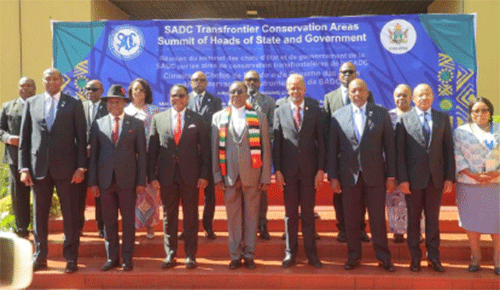Southern African leaders have pledged stronger support for transboundary conservation and local community involvement in managing natural resources.
This commitment was butressed during the first-ever Transfrontier Conservation Areas’ (TFCA) Summit held in Harare on Friday.
It marked 25 years of collaboration on TFCAs, which are conservation zones that cross national borders to promote biodiversity protection, regional integration and sustainable development.
The gathering marked the 25th anniversary of TFCAs under the theme ‘Transfrontier Conservation Areas – 25 Years of Cooperation for Regional Integration and Sustainable Development.’
The summit was hosted and chaired by Zimbabwean president Emmerson Dambudzo Mnangagwa, who currently serves as SADC chairperson. It brought together several Heads of State and Government, including president Lazarus McCarthy Chakwera of Malawi and president Hussein Ali Mwinyi of Zanzibar, as well as prime minister Ntsokoane Samuel Matekane of Lesotho and prime minister Russell Mmiso Dlamini of Eswatini.
Prime Minister Elijah Ngurare represented Namibia.
Other high-level representatives included ministers Ana Paula de Carvalho Pereira of Angola, Wynter Mmolotsi of Botswana, Dion George of South Africa, Rodney Sikumba of Zambia, ambassadors Emilie Ayaza Mushobekwa of the Democratic Republic of Congo, and ambassador Carvalho Muária of Mozambique.
In a detailed communiqué, the summit praised the role of TFCAs in strengthening peace, promoting sustainable natural resources’ management and advancing socio-economic development across borders.
“The Summit acknowledged the outstanding value of TFCAs as symbols of regional cooperation, peacekeeping and sustainable development, and emphasised the need for continued, strengthened collaboration among stakeholders to advance TFCAs’ impacts at the regional and international levels,” the statement read.
Celebrating a quarter-century of cross-border conservation efforts, the summit committed to deepening cooperation among governments, local communities, the private sector and international partners – with people at the centre of this agenda.
“Summit expressed its commitment to the SADC environmental, conservation and development agenda, to be implemented through stronger partnerships centred on human well-being,” it added.
The leaders called for greater inclusion of rural communities, especially young people, in decision-making and conservation work, underscoring the importance of fairness in sharing the benefits of TFCAs.
“Summit urged member states to strengthen the meaningful and active participation of rural communities, including the youth, in TFCAs, and stressed the importance of accountability to ensure equitable benefit-sharing in fostering inclusive conservation efforts across the region’s TFCAs,” the leaders stated.
Responding to rising conflicts between humans and wildlife, the Summit recommended coordinated action and legal reforms.
“Summit urged member states to consider the development of tailor-made, practical and effective approaches to address increased human-wildlife conflicts, and urged partners to prioritise the development of solutions, including legislation,” it was agreed.
The Summit likewise recognised the need to unlock new conservation funding models, urging governments to explore options such as carbon markets, biodiversity bonds, ecotourism and public-private partnerships.
“Summit urged member states to embrace innovative and sustainable financing mechanisms for TFCAs to ensure that TFCAs continue to deliver socio-economic and conservation benefits to the SADC region,” they said.
Additionally, the summit supported expanding conservation into coastal and marine areas as part of implementing the SADC Blue Economy Strategy, and stressed the need to fight wildlife crime through regional cooperation.
Another key highlight of the summit was the endorsement of a pilot SADC Tourism UNIVISA by five countries—Angola, Mozambique, Namibia, South Africa and Zimbabwe—to ease cross-border travel and boost intra-regional tourism.
In a bold move to address climate challenges, the Summit called for the development of a regional carbon market framework, recognising its potential to support conservation, while creating jobs and accessing climate finance.
“Summit acknowledged that trading of carbon credits presents an opportunity for economic development, job-creation and access to climate finance, and a driver for change that can contribute to fighting climate change impacts,” it said.



